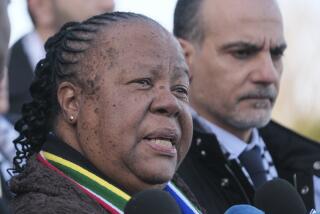S. Africa Action on ‘Pass Laws’ Labeled a Ploy
- Share via
Dr. Mamphela Ramphele, a South African physician who was “banned” for five years in South Africa, said Saturday in Anaheim that the South African government’s announcement it would no longer enforce notorious “pass laws” was an effort to diffuse world protest.
Ramphele, who in 1977 was banished to a black township 1,000 miles from her home after raising questions about the suspicious death of a black activist, made her remarks yesterday after an address to an audience of about 8,400 at an assembly of United Methodist Women at the Anaheim Convention Center.
On Friday, South African President Pieter W. Botha said that his country’s pass laws would no longer be enforced and ordered the immediate release of all prisoners held for violating those laws, which have required blacks to carry passport-like booklets.
Called a ‘Checkmate’ Move
Ramphele said Botha’s decision was timed to undermine the strategy of anti-apartheid activists, who had planned nationwide demonstrations against the pass laws on May 1. The move, she said, was an effort by the white minority government “to checkmate the efforts of the (black) people to use pass laws as an organizing force.”
Repealing the law also may have been a cost-cutting measure, she said, because arresting and processing violators--estimated at 200,000 to 300,000 a year--is expensive.
But the announcement will mean that a relatively few black South Africans--notably those who now live illegally in urban areas--can go about their lives without the constant worry of being arrested for failing to possess a pass, she said.
The pass laws, Ramphele said, have effectively kept most blacks away from employment in urban areas, often forcing them to commute many hours to rural jobs and disrupting their lives and families. “And they are not about to find jobs or houses or a stable family, simply because the law has been removed on paper,” she said.
One of three speakers addressing the topic “A World in Search of Justice,” Ramphele portrayed her homeland as a place of desperation, where economic and racial oppression and “increased militarization” by the government have created a generation of young people for whom “death has lost its sting.”
“The children are convinced they have nothing to lose, so they are out to destroy the very foundation of the society that has given them nothing. . . , “ Ramphele told the audience.
Ramphele’s own 8-year-old son is the child of black nationalist leader Steve Biko, who died in the custody of South African authorities in 1977. Besides announcing the end of pass laws on Friday, the South African government said that Steve Biko’s book, “The Testimony of Steve Biko--Black Consciousness in South Africa,” would no longer be banned.
Learning of this after her talk, Ramphele smiled and said that the book had circulated freely despite the ban. Lifting the ban, she suggested, was simply another attempt to “improve the image of South Africa.”
More to Read
Sign up for Essential California
The most important California stories and recommendations in your inbox every morning.
You may occasionally receive promotional content from the Los Angeles Times.













